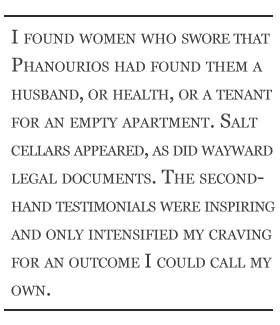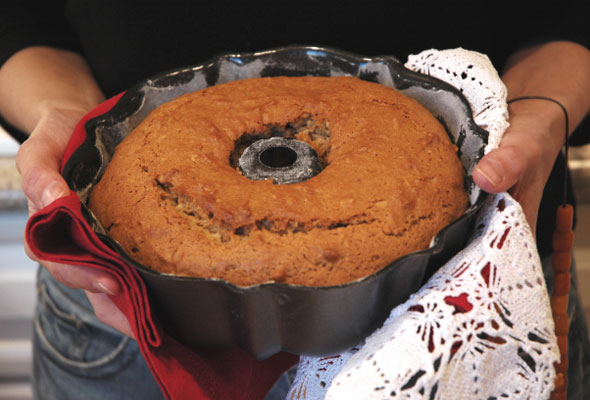


The problem wasn’t just that August night. This time last year, things weren’t going well. Work was scarce, household finances unstable. But even money woes seemed preferable when set against my emotional state. Drained and depressed, I’d sunk into a lingering malaise. Maybe it was the realization that I was turning 40. Maybe the role of Restaurant Widow was taking its toll: I almost never saw my husband, a sommelier. Come Sundays, we were too exhausted to connect or even care that we didn’t. Plowing through the weeks with something akin to single-parent status, I sat alone most nights feeling irrelevant and irritable, full of too many thoughts and too much hunger.
Searching for comfort, I immersed myself in the desserts section of the book. A simple spice cake caught my eye. The ingredient list was nothing much—it included the walnuts, cinnamon, and cloves typical of Greek pastry—but the name of the recipe intrigued me, as did its legend.
Called a phanouropita (pronounced “fan-oo-RO-pee-ta”), the cake honors the Greek Orthodox Saint Phanourios, a martyred soldier whose icon, lost for centuries, was found in perfect condition under the rubble of a ransacked church in Rhodes in the early 1500s. Since then, worshippers, mostly women, have followed a tradition of baking and giving away this cake when they want to locate something missing. Phanourios, whose name relates to the Greek verb “I reveal,” apparently will find things for you, but you have to ask him. Sweetly.
Phanourios appealed to me. In his icon, he holds a lit candle, the promise of revelation, and I was sick of sitting in the dark. In truth, I felt lost. Maybe this saint and his cake could help.

According to the recipe I used that day, custom required beating the batter with a wooden spoon for nine full minutes. (Nine, I found out later, are the levels of holy angels in the Church.) After two or three minutes, I was losing enthusiasm. At six minutes I started equating the task with penance. By the nine-minute mark, I figured I’d atoned for a lifetime of sin but found myself in hell anyway. My arm was on fire.
The batter had a strange consistency, gummy and dense. I coaxed it to the corners of a loaf pan. I figured it was a flop but couldn’t know unless I baked it. First, however, some ceremony was in order. I placed a printout of Phanourios’s icon on the counter and searched my mind for something the saint could retrieve for me. My husband wasn’t exactly missing; I hadn’t lost my keys or wallet. I could use another paying job, but that seemed too ambitious to start with.
In the end, I failed to ask for anything. I did, however, crouch in front of the oven to make a timid sign of the cross. When my son wandered into the kitchen and asked what I was doing, I quickly straightened and stuffed my hands in my pockets. “Nothing,” I said. “Baking a cake.”
The cake smelled like something from my grandmother’s kitchen. Cutting the traditional nine slices (those angels again), I ate one to be sure it tasted good, then bagged the others. On Sunday I planned to visit Manhattan’s Greek Orthodox Cathedral, where I’d never been before. I had no idea who I’d give the cake to, but it turned out not to matter—encountering a man begging in front of the church (he almost seemed planted there to test me), I realized I’d forgotten to bring the cake along. I gave him a dollar, sat through three hours of service, and went home. I did venture out with the cake later on, but gave up after the first homeless person turned it down.
Even giving the cake away was harder than I’d imagined.

I’m not sure what compelled me to make a full-blown project out of the phanouropita, why I couldn’t just let it go. Maybe it was stubbornness. More likely, I harbored some masochistic hope that if I kept pressing the sore, hollow spot I felt—if I kept making the cake—eventually I’d discover what was missing. I gave away cake after cake, sometimes leaving them next to sleeping homeless people, other times donating them to the church or giving them to friends. I tried different recipes and meditated on more specific prayers: perhaps the saint could find me a new client after all, or a magazine willing to take a story. I started keeping score: cakes baked, prayers answered. I prepared the same recipe in a purgatorial loop, sifting and mixing week after week, waiting for something to happen.
While I waited, I decided to take classes in food writing and offered my services as a recipe tester. I began developing and sharing my own recipes as well, wading slowly into the blogging community. I got to know the owners of Greek bakeries and specialty shops, and wherever I encountered Greeks, I made sure to ask about the cake, unearthing anecdotes about the mysterious saint. I found women who swore that Phanourios had found them a husband, or health, or a tenant for an empty apartment. Salt cellars appeared, as did wayward legal documents. The secondhand testimonials were inspiring and only intensified my craving for an outcome I could call my own.
During the first weeks of 2010, the scorecard for Phanourios stood at 11–0. I’d baked 11 cakes and none of my prayers had been answered.
Sure, the repeated act of baking and giving away a modest cake had brought me a keener sense of purpose. Yes, its traditions shoved me out into the world again, where I was interacting with people who shared my interests, especially food. And it was true that I wasn’t exactly alone anymore, rattling around inside a disconnected life. I’d found—or had been shown—new ways of engaging with others, ways that went beyond the confines I had assumed were inevitable for a stay-at-home mom, a home-alone wife, and a freelance professional whose desk was the dining table and who worked, next to piles of wrinkled laundry, on assignments for clients I never saw.
Suddenly I was stunned by my lack of insight. I’d been waiting for something that hadn’t arrived. Yet the saint had delivered the one thing I’d been missing most of all: connection. He’d done this even when I didn’t know to ask for it by name.
As for the things I did request, from that moment, they started coming, too, fast and furious through the rest of the year. New clients in the city, lucrative projects, recipe contests, and publication—Phanourios and I went on a tear. I began to think of this mysterious martyr, this solider with a sweet tooth, as my patron saint. I continued to haul his cakes around town, making them for charity events and giving them to strangers down on their luck. But the quid pro quo was over, and I stopped keeping score. There was no need to think about it anymore. Baking the cakes was now just something I did, often on Sundays—something that fed my spirit at the end of a rewarding week’s work.
There’s a deliciousness to my days now that wasn’t there before, a gratitude for the many ways I now connect with others and make a more significant contribution to the world around me. I bake the cakes less frequently, that’s true. Writing, recipe development, family life, and a full client load take up most of my time. Tomorrow, though, August 27, is the feast day of Saint Phanourios. Tonight I will bake the twenty-sixth cake in his honor. I’ll sift powdered sugar gently over the top, slice it, and have some in the morning with coffee. When I do, I’ll say a grace for all the ways my life has changed in the past year. As for giving the cake away, with my recipe for phanouropita—and a sense of what’s possible—I give it to you.









Dear Allison,
You cannot imagine how much I needed to read this. I’ve been going through struggles of my own and feeling really defeated. Its more of an internal strife than anything or anyone else effecting me. Reading your beautiful writing has uplifted my spirits and given me something I had long given up: hope.
This is the very first article I’m reading on food writing, weird because I love food and good writing. I used to be a writer myself, but somehow it’s now in the periphery of my life. I wish I did more of it. Experiencing food has kinda taken its place, for now at least.
I was missing some connection, perhaps more with myself than with any other person. But reading this article makes me feel connected, to you and to everyone else who has responded, and I want to thank you for that. Such an amazing gift you have to be able to make people feel this way…I can’t wait to make this cake.
Sapna
Hello, Sapna. I’m embarrassed, because it’s been so long since you wrote your comment, and I’m only seeing it now, believe it or not. Life’s been more topsy-turvy again in 2013, but I still love the connections that this cake makes for me, for others. I still bake the cake, actually, though less frequently these days. I hope that you did indeed make the cake and that in any event you have been feeling more comfortable inside yourself, feeling connected, and that maybe you’ve even begun to piece together food and your writing life. Anyway, thank you so much for taking the time to comment here; your words in turn mean a lot to me. ~ Allison
Allison,
How lucky we are to live in the days of blogs and posts that last longer than expected! Today, while driving back from a client meeting, I noticed my wedding ring was missing! Uggg. I searched everywhere to no avail. Starting to panic, I said a quick prayer to St. Phanourious asking for his help. Lo and behold in less than two minutes, I knew where to look…and there it was. So, I am making your recipe tonight to share with my 8 co-workers who tore through the office trying to help me locate my ring. I googled a recipe and yours came to the top. Now, after reading the post, I am in tears and grateful for the connection you and St. Phan have developed. 🙂
Thanks for writing!
~erica (eirene) robinson
convert to Orthodox Christianity (Pentecost ’96)
Erica/Eirene-
I love those stories! Thanks for sharing yours. Hope your coworkers enjoy the cake. On my side, I’m grateful that my words still resonate for readers. You were kind to let me know. Hope you always find exactly what you’re looking for in life. ~ Allison
Hi Allison,
I was just looking for a recipe for this cake. I joke that I owe him many cakes because I am always losing things, and I do believe he helps me find them. I was thinking that I should learn the proper way to bake this cake. I’m not Greek nor is my background, but I converted to Orthodoxy in a Greek Orthodox Church. It interested me that you became Presbyterian, I used to be Presbyterian! As I read on I began to see that we have more in common: I’m a stay at home mom and also an artist, working on being creative alongside my house work. My husband is a teacher and working on a doctorate so I also feel disconnected at times. I am realizing that I need to connect with people more, and I’m inspired by your story. I think, since I owe so many cakes, I will find more connection through the sharing of them. This is a beautiful thing.
thank you,
Dana
Dana,
Thanks for taking the time to comment. It’s great to hear from you, and I’m so glad that you have found meaning in my story. I guarantee that if you make and share this cake (once or many times), you won’t be able to help the connections that follow. I think the act of baking this cake primes a person to be receptive to and grateful for other people, and sharing the cake becomes something personal, even if shared with strangers. I hope you find the connections you’re looking for. Thanks, too, for sharing some interesting ways in which our lives seem to cross.
All the best to you–
Allison